| |
Observing
tips: Look
west 30 to 60 minutes after sunset when
the Sun has dipped 6o to 16o below the horizon.
If you see luminous blue-white tendrils spreading across the sky,
you've probably spotted a noctilucent
cloud. Although
noctilucent clouds appear most often at arctic latitudes, they have
been sighted in recent years
as far south as Colorado, Utah and Virginia. NLCs are seasonal,
appearing most often in late spring and summer. In the northern
hemisphere, the best time to look would be between mid-May and the
end of August. See also 2003,
2004, 2005,
2006, 2007,
and 2008 |
 |
| |
| |
Photographer,
Location |
Images |
Comments |
|
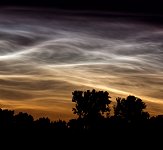
|
Mike
Hollingshead,
Blair, Nebraska, USA
Jul. 14, 2009 |
#1,
#2,
more |
I've
never seen these clouds before. And I'm often out looking.
They are rather rare here in eastern NE. These two were
telephoto between 100-400mm at a not so wonderful 800-1600
ISO(thanks to F4.5-5.6) for 15-20 seconds. Wish I had not
recently busted the 50mm F1.8 as it would have been great
for this. Well now that I look one was F5, 400 ISO 23 seconds
and the other 1600 ISO F4.5, 16 seconds. |
|
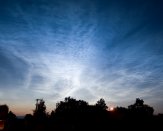
|
Eve
Wills,
Dillon, Montana
Jul. 15, 2009 |
#1,
#2, #3,
#4 |
I
awoke to a brilliant display of noctilucent clouds. They
were so bright, that I would have assumed dawn was imminent,
only it was an hour and a half until sunrise! |
|
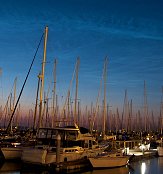
|
Joseph
Marsh,
Shilshole Marina, Seattle, Washington, USA
Jul. 14, 2009 |
#1,
#2, #3,
#4 |
We
have been waiting a long time to see this high altitude
show in Seattle. It was a perfectly clear night, and we
were ready after hearing of sightings in Oregon yesterday.
Photos shot on July 14, 2009 between 2102 hrs and 2131 hrs.
PDT looking northwest using a Canon G10 set at approximately
f 3.5, 3.2 seconds, ISO 100 for each exposure. |
|
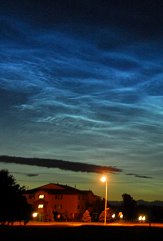
|
Mark
Poe,
Aberdeen, South Dakota, USA
Jul. 15, 2009 |
#1,
#2, #3,
#4 |
I
had never witnessed NLCs before, and to be honest, I wondered
if I would actually notice them if I did get the chance
to see them. Wow, was I wrong ... these literally startled
me! Thankfully, I was called to go meet a friend this evening,
otherwise I wouldn't have been outside to see them. I walked
out of my garage, and glanced up expecting to see a mostly
dark sky, and this BRIGHT, electric blue bank of NLCs was
filling most of the north sky ... gorgeous! I immediately
turned around to get my camera, then went to a nearby parking
lot to take these pics. Even though it had only been a few
minutes, the brightness had faded somewhat from when I first
saw them -- they were FAR brighter than what I was expecting.
What a great display for my first viewing of NLCs! |
|
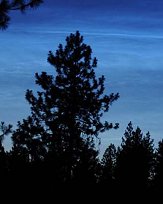
|
Larry
Karlson,
Spokane, Washington, USA
Jul. 14, 2009 |
#1,
#2, #3 |
NLC
taken near Spokane, WA USA at about 10:00 pm Pacific Daylite
Time. They were very bright! In one shot you can see Ursa
Major. Taken with Nikon D90 ISO 320 8s at f/8. |
|
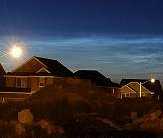
|
Steven
J. Denfeld,
Bend, Oregon, USA
Jul. 14, 2009 |
#1 |
Certainly
the biggest display I've seen from Central Oregon, if not
quite the brightest. Beautiful! Panasonic DMC-TZ5 ISO 100
30sec. exp. |
|
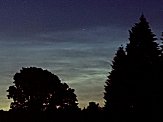
|
Albert
Frank,
Philomath Oregon
Jul. 14, 2009 |
#1,
#2, #3 |
Olympus
C8080 ISO 400 5-15 seconds exposure |
more
images: from
Janis Woolbright of Woodland, Idaho; from
Greg Ainsworth of Bozeman, MT; from
Jason Barnable of Sioux Falls, SD; from
Jim Tegerdine of Marysville, Washington;
|
|
|








